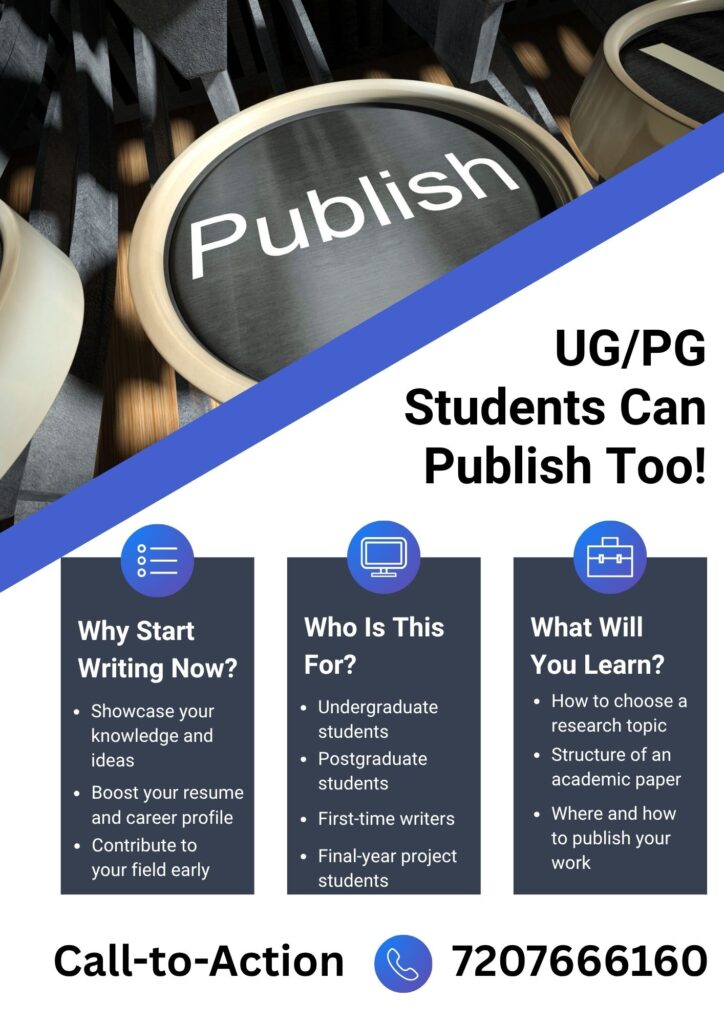Introduction
So, you’re a UG/PG student, and someone just mentioned academic publishing to you. Your first thought? “That’s for professors and PhDs, not me!” Right? Well, think again. Academic writing is no longer an ivory tower reserved for senior scholars. UG/PG Students are increasingly stepping into the world of research and publishing — and thriving. Generally academic publishing simply means sharing your knowledge, ideas, or research in a formal, structured, and peer-reviewed format. It may sound intimidating, but the truth is — if you’ve ever written a term paper, thesis, or even a well-argued essay, you’re already halfway there.
Breaking the Myth: Students Can Publish(UG/PG)
- You Don’t Need a PhD to Publish: One of the biggest myths in academia is that you need a doctorate to publish. Nope. Many UG/PG Students across the globe are already publishing papers, literature reviews, and case studies. Journals are open to fresh perspectives and new voices — yours included and also.
- Real-World Value of Publishing Early: Publishing teaches you critical thinking, how to construct solid arguments, how to cite responsibly, and how to contribute to global conversations in your field. These are real-world skills that give you a serious edge, no matter where you’re headed next.

Benefits of Publishing as a UG/PG Student
- Academic Credibility and Portfolio: Think about it: while your classmates might just have class notes and assignments to show, you’ll have a published paper — proof of your expertise and curiosity.
- Enhancing CVs for Higher Studies or Jobs: Whether you’re planning to apply for a Master’s, PhD, or a competitive job, a publication boosts your CV tremendously. It signals initiative, diligence, and deep subject knowledge.
- Personal Growth and Confidence: There’s something empowering about seeing your name in an academic journal. It boosts your confidence and motivates you to explore more.
How to Start Your Academic Writing Journey
- Understanding Research Fundamentals: Begin by learning the basics — what is a research question? What are hypotheses? What makes a paper scientifically sound?
- Picking a Research Topic: Pick something that excites you. It doesn’t have to be Nobel-worthy — just something meaningful, manageable, and original.
- Aligning with Your Coursework: Leverage your class assignments, term papers, or mini-projects. You can often expand or refine them into publishable content.
Getting Support: Mentorship is Key
- Finding the Right Mentor or Guide: Your professors, teaching assistants, or research scholars in your department can offer valuable guidance. Don’t hesitate to reach out — most are eager to help students who show initiative.
- Collaborating with Professors: Joint publications with faculty can enhance your work’s credibility. Plus, their insights can help shape your research more professionally.
- Peer Writing Groups and Communities: Join or form student writing groups. Peer feedback is gold. Communities like ResearchGate or academic subreddits can also provide support.
Choosing the Right Journal
- UG/PG-Friendly Journals: Look for journals that accept student research or have sections for early-career researchers. Some universities even have student-run journals.
- Indexing and Reputation Matters: Choose a journal indexed in databases like Scopus, Web of Science, or Google Scholar. It increases the visibility of your work.
- Open-Access vs Subscription Journals: Open-access journals are freely accessible and offer wider reach, but may charge fees. Subscription journals may be free to submit but are limited in audience.
Case Study: A UG/PG Student’s Publication Journey
- Background and Motivation: Meet Priya, a second-year B.Sc. student. Fascinated by climate change, she turned her class project into a literature review.
- Steps Taken:She worked with her professor, used Google Scholar extensively, wrote the review, and submitted to a student journal.
- Outcome and Impact:The paper got accepted. Now, Priya is presenting at a student research conference and already planning her next project.
Literature Review for UG/PG Students
- How to Conduct a Literature Review: Start with a research question. Use databases like JSTOR, PubMed, or Google Scholar. Identify gaps, debates, and trends.
- Tools and Platforms for Efficient Searching: Tools like Mendeley, Zotero, and EndNote can help manage citations. Use Boolean search terms for precision.
- Writing Your First Review: Structure it with an introduction, body (thematic or chronological), and conclusion. Keep it analytical, not just descriptive.

Avoiding Plagiarism and Ensuring Originality
- Understanding Plagiarism in Academia: Copy-pasting without crediting is a strict no-no. Even paraphrased ideas need citations.
- Tools to Check Plagiarism: Use Grammarly, Turnitin, or Quillbot to check for unintentional plagiarism.
- Citing Sources Properly: Follow citation styles like APA, MLA, or IEEE as per your discipline. Use citation tools to stay organized.
The Submission Process Demystified
- Preparing Your Manuscript: Check the journal’s guidelines carefully. Format your paper accordingly — font, layout, citations, etc.
- Dealing with Submission Platforms: Most journals use online portals like ScholarOne or Editorial Manager. Create an account and follow instructions step by step.
- Responding to Reviewers: Expect feedback. Address every comment politely and revise accordingly. Don’t panic if it’s a “revise and resubmit” — that’s normal!
Conclusion:
In conclusion publishing as a UG/PG Student isn’t just possible — it’s a powerful step toward academic and personal growth. Whether you aim for academia, industry, or entrepreneurship, academic writing builds a foundation of credibility, discipline, and expertise. So, don’t wait for a degree to start contributing to knowledge — you’re ready now.
Read More about the topic:
Understanding Journal Metrics: Impact Factor, Scopus Index, H-Index and More
Journal Publishing for PhD Students: When, Where, and How to Begin


Leave a Reply